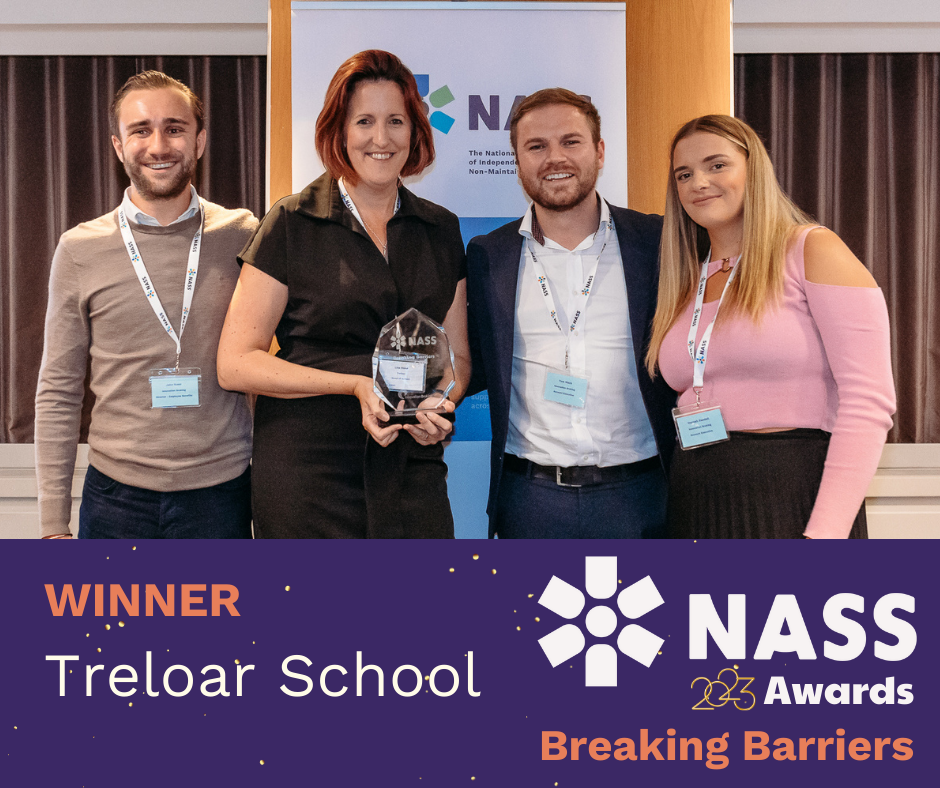 The NASS Breaking Barriers award recognises a person, team, establishment, or organisation that has carried out exceptional work engaging with external stakeholders to ensure positive and sustainable outcomes for children and young people.
The NASS Breaking Barriers award recognises a person, team, establishment, or organisation that has carried out exceptional work engaging with external stakeholders to ensure positive and sustainable outcomes for children and young people.
2023 shortlisted nominees:
- Arc Oakbridge School – Tackling misconceptions about reading and English
- The Deaf Academy – The history of The Deaf Academy project
2023 Winner: Treloar School – The Clarion project
Summary of the shortlisted and winning projects
Arc Oakbridge School – Tackling misconceptions about reading and English
Arc Oakbridge School is an independent specialist school in central Birmingham for children and young people aged 7 to 17 years who are on the autism spectrum and have complex needs.
The Arc Oakbridge project has done a commendable job in breaking down misconceptions about autism and fostering a love for English and reading among its students. Their personalised approach, understanding each student’s likes and dislikes, has proven to be effective.
The ‘Drop Everything and Read’ daily sessions and school reading and writing competitions have further encouraged students to embrace English. The success of this approach is evident in the fact that around 50% of its pupils became published authors or poets in the last 12 months. At least 18 pieces of their work were published in anthologies, ten pupils were featured in the Power of Poetry – Into the Unknown, five short stories featured in Interger, and three have been published in Imagine UK Verse.
Arc Oakbridge shared their delight that that these achievements were made by students who previously would never have put pen to paper and claimed to “hate English” and “hate writing”. The school’s methods demonstrated the power of understanding, patience, and innovative teaching.
The Deaf Academy – The history of The Deaf Academy project
Located in Devon, the Deaf Academy is a non-maintained special school and Further Education college for Deaf young people aged 9-25, and currently has around 60 students.
The project, “The Amazing History of the Deaf Academy,” was devised to break down barriers around representation for Deaf British Sign Language (BSL) users with additional needs. The project was a collaboration with Paddleboat Theatre Group and Lucy Rogers, a Deaf illustrator, and David Ellington, a Deaf actor/director.
The students produced a BSL accessible children’s book and film that charted the history of Deaf education in the UK from the 18th Century to the present. The book is distinctive as it is the first children’s book to explain the UK’s Deaf education history. It was important to the students that all collaborators were either Deaf or immersed in Deaf culture.
The book launch was attended by over 100 community members and is now on permanent display at a local museum. It has been exhibited at events including at the University of City Lit. The book has been at the forefront of many discussions in national Deaf organisations.
The project was characterised by multi-agency co-operation and resulted in students achieving Gold and Bronze Art Awards. The Deaf Academy reports that many of its students’ future ambitions have changed, becoming more aspirational and understanding that being Deaf is not a barrier to their dreams. Its students have commented on the increased self-confidence they now feel in participating in discussions with hearing citizens. The book acted as a bridge to the deaf community, inspiring many organisations to contact them for Deaf Awareness training.
Treloar School – The Clarion project
Based in Hampshire, Treloar School is a non-maintained special school for 2 to 16 year old students with physical disabilities. However, some students with particular learning/emotional difficulties may stay with them until the age of 18. It has room for over 70 weekly and termly residential and up to 40 day places.
Treloar School seeks to break down barriers in education for students with additional needs, such as deafness, autism, social-emotional difficulties, physical disabilities, and sensory impairments. The school uses a multi-disciplinary holistic approach to develop personalised curriculums that enable students to reach their full potential.
A key example of this approach is the school’s music department’s collaboration with Open Up Music to use ‘Clarion’, an innovative accessible instrument that can be played expressively with any part of the body, including eye movement using iPads and PCs. The use of Clarion has been expanded at the school to increase opportunities for access and enable creativity and expression.
The benefits of this collaboration have been significant, with students progressing from playing single notes to performing both internally and externally as part of an orchestra. The school has also employed a peripatetic music teacher to lead both individual and group Clarion music sessions.
The project has seen a record number of students accepted into the National Open Youth Orchestra, one student performed at a professional level with BSO Resound, an increased number of Clarion users year on year, and in addition parents and carers requesting Clarion workshops for home support.
The music department collaborates with external and internal departments to continually push boundaries and adapt the use of Clarion. Treloar Schools says the Assistive Technology department has used 3D printers to create templates which act as guides to section off areas of the iPad screen, enabling students with limited mobility to access the instrument independently.
The department has also challenged the Associated Board of the Royal School of Music (ABRSM) examining board to ensure Clarion is recognised as an examinable instrument. The school was chosen for the Clarion pilot with ABRSM, breaking down access barriers for all individuals with a physical disability wanting to complete a music exam.